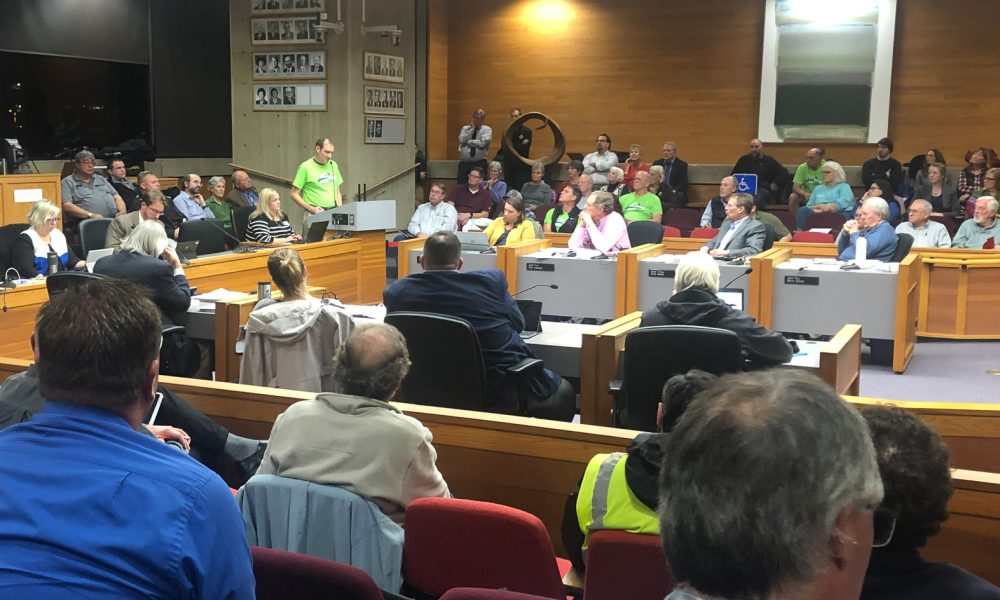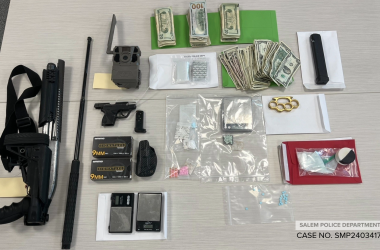 Residents gave public testimony for two hours at Salem City Council on Monday. Councilors ultimately voted to host a work session and postpone a motion that would have renewed momentum for the Salem River Crossing. (Troy Brynelson/Salem Reporter)
Residents gave public testimony for two hours at Salem City Council on Monday. Councilors ultimately voted to host a work session and postpone a motion that would have renewed momentum for the Salem River Crossing. (Troy Brynelson/Salem Reporter)
The Salem City Council went for a “pinky swear” Monday night, deciding to postpone until January whether to pursue a third bridge over the Willamette River.
Councilors followed nearly two hours of public testimony over the proposed Salem River Crossing by not voting for a motion from Councilor Jim Lewis that would have directed city staff to start answering questions the state needs for the project to move forward.
Councilors instead voted 6-3 in favor of a proposal from Councilor Tom Andersen to hold a work session in January to study the years-old project, its impacts and potential costs.
A verbal agreement, or “pinky swear” as Mayor Chuck Bennett called it, accompanied that motion to bring Lewis’s motion back to council for a vote in February.
“Let’s just all raise our hands and kind of pinky swear we’re not going to frustrate the opportunity to vote on this,” Bennett said. “We do have a chance to kind of make a decision on this issue and not leave it floating.”
Councilor Cara Kaser seconded Andersen’s motion. Councilors Brad Nanke and Steve McCoid joined Lewis in voting against it.
Council did vote against Lewis’s motion indirectly. Councilor Steve McCoid made a substitute motion that would have combined Andersen’s and Lewis’s motions, setting up a work session and directing staff to answer the state’s questions, but it was voted down 6-3.
The vote by council slows an attempt by Lewis to breathe life back into the proposed third bridge. It has idled since August 2017 after the state Land Use Board of Appeals asked the city to update population forecasts and address zoning issues near the Willamette River.
The bridge has been among the most divisive issues in city politics since 2006. It has split voters in races for local offices. A majority of councilors today say they oppose the bridge because of possible disruption to homes, businesses, the environment and its costs.
When pitching his motion, Andersen argued the project has been squabbled over for so long that councilors need to sit down and consider the project’s possibilities and its stakes.
“We heard a number of different contentions tonight about ‘It will do this’ ‘It will do that’ ‘No it won’t’ ‘Yes it will,’ it just seems to me we ought to have a work session where we can get the answers to this from the staff,” Andersen said.
Such contention was displayed during the public hearing. Depending on the speaker, the bridge either hurt or helped the environment and the region’s economy. Supporters of the bridge spoke more often than opponents.
“This doesn’t mean building a bridge is a certainty, but it makes it a possibility,” said Craig Evans, a member of the pro-bridge organization Salem Bridge Solutions, in support of Lewis’s motion.
Linda Wallmark, a member of the climate watchdog group 350 Salem OR, argued the bridge would increase carbon emissions and cost too much taxpayer money and city staff time.
“We must allocate our limited resources toward adaptive measures and decreasing emissions rather than diverting them toward expensive projects which actually increase emissions,” she said.
By pushing the vote to February, the bridge’s chances likely get even slimmer. McCoid will be replaced in January by Jackie Leung, who opposed the project during her campaign.
Lewis also worried that pushing the vote could pit local officials against the federal government. He said the Federal Highway Administration, which has so far put $8 million toward feasibility studies on the bridge, could ask for its money back if the project doesn’t advance by September 2019.
“My only concern is that if this body waits until February to direct staff to come back with its response to (the state land use board), then you add six-to-nine months staff say they need to do that response – we’re out of time,” Lewis said.
Julie Warncke, city transportation planning manager, said the city staff will focus on designing the January work session.
“We’re going to meet with management to find out what format, who’s leading it,” said Warncke, who has been in the city’s transportation planning department for 16 years.
She added that the staff have been down this particular road in 2012, hosting a series of work sessions with councilors.
“It’s true it’s gone on in one form or another for decades,” she said.
Have a tip? Contact reporter Troy Brynelson at 503-575-9930, [email protected] or @TroyWB.









